Classic Comedy Year: 1990
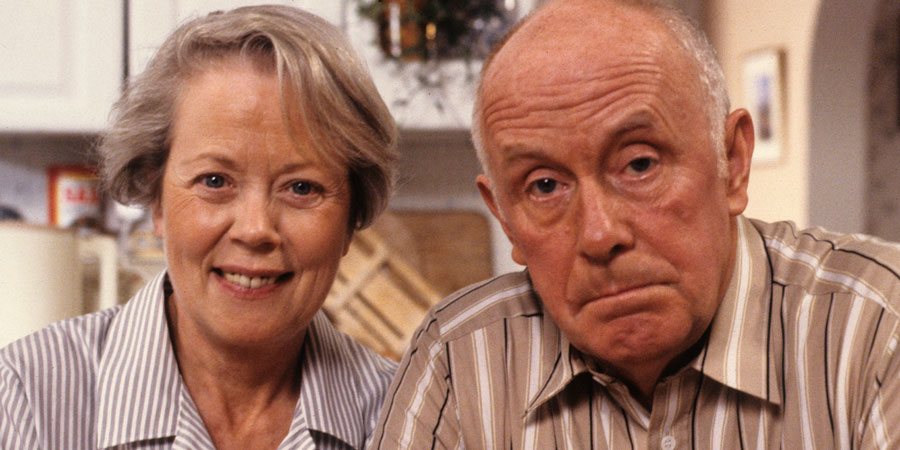
Iraq invaded Kuwait. Margaret Thatcher was thrown out of office. Marathon bars changed their name to "Snickers". Yes, there is little doubt that 1990 was a momentous year. But it was a big year for the comedy world too. Don't believe me? Then just think...
Four major new sitcoms started...
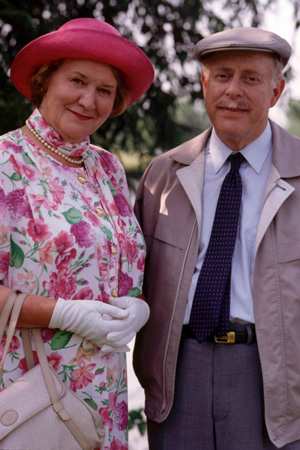
The 1990s would actually prove something of a period of decline for the traditional sitcom. But there was little obvious sign of this in 1990 with several major additions to an already crowded field.
Some readers may scoff at the suggestion that Keeping Up Appearances was a "major" sitcom. But Roy Clarke's series based around the turbulent domestic life of the ultra-snobby Hyacinth Bucket (famously pronounced "Bouquet"), played by Patricia Routledge, was a huge ratings hit so definitely warrants inclusion. The series ran until Routledge had had enough of it in 1995 but repeats still command large audiences today, both in Britain and around the world.
On first glance, David Renwick's One Foot In The Grave was every bit as traditional as Keeping Up Appearances was. But appearances can be deceptive. Yes, OFITG may have had a catchphrase ("I don't believe it!" from Richard Wilson's famously exasperated Victor Meldrew) and the set up may have seemed conventional - with Angus Deayton and Janine Duvitski effectively playing younger versions of the elderly Meldrews living next door - but a deep recurrent theme of melancholy would run throughout the series. The first episode saw Meldrew laid low by sudden early retirement for example (he was a security guard), while a later edition revealed the Meldrews had once lost a child, a subject never returned to again. This didn't stop the show from being hugely popular, only ending with Victor himself being killed off in 2000. Renwick has since written Love Soup, and was concurrently penning - and has continued to write - Jonathan Creek.
1989 had seen the effective departure of one major Rowan Atkinson character: Blackadder. 1990 would see the arrival of another. Mr Bean, would in fact prove an even bigger hit than Blackadder, spawning two features films, two spin-off cartoon series and establishing Atkinson forever as an international comedy star. British critics (though generally not audiences) have tended to be a bit snooty about the series, perhaps missing Blackadder's clever dialogue. But as a vehicle for Atkinson's genius for physical comedy, the run of occasional Bean one-off specials were undoubtedly a triumph.
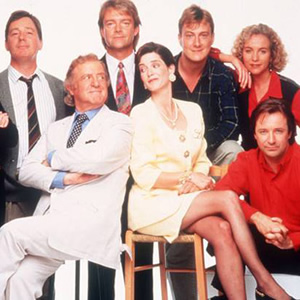
Finally, Drop The Dead Donkey (originally to be entitled Dead Belgians Don't Count) proved a major hit for Channel 4 this year. Set in the busy offices of Globelink News, the hook was that each episode of the sitcom was recorded shortly before transmission so as to enable the last minute inclusion of topical material, a definite asset during the ongoing uncertainty of the 1990-91 Gulf Crisis.
Th topical 'gimmick' was probably less crucial to its success than the strong writing, characters and cast. The show also featured memorable episodes such as a stray microphone recording an unpopular female newsreader having sex (thus being overheard by the entire office - apparently based on a real life newsroom incident) and an enjoyably raucous Christmas office party episode which saw good natured but wimpy editor George (the brilliant Jeff Rawle) waking up in a railway station having inexplicably obtained a large signed framed photo of Frankie Howerd in the meantime. The series ran until 1998 and effectively launched Stephen Tompkinson and Neil Pearson as TV stars - not to mention confirming writer-creators Andy Hamilton and Guy Jenkin as a force to be reckoned with.
Four other new major comedy shows started...
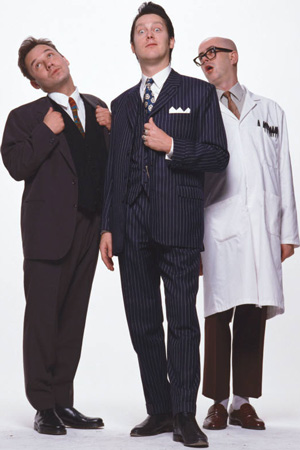
It's actually possible to argue a full blown comedy revolution occurred in 1990. For whatever else it was or wasn't, Vic Reeves Big Night Out was certainly original. In truth, Bob Mortimer certainly deserved equal billing (the idea was that Vic's show was being endlessly interrupted and sidetracked by Bob in various guises). Thanks to this, The Smell Of Reeves And Mortimer, Shooting Stars, House Of Fools and other vehicles of variable success and quality, Vic and Bob have been with us ever since. It's doubtful they get through a week even today though without someone shouting a catchphrase from their big break at them, namely: "Vic! I've fallen!", or "What's on the end of the stick, Vic?" to the total incomprehension of everyone else.
Another young comic not afraid of a catchphrase was Harry Enfield, already a star before his first proper series - Harry Enfield's Television Programme - aired in 1990, thanks to the huge success of Channel 4's Saturday Live characters Stavros and Loadsamoney. His 1990 sketch show (which also featured Paul Whitehouse and Kathy Burke) included a plethora of new characters, notably The Slobs (or as they might be termed today "The Chavs"), Tim Nice-But-Dim and DJs Smashie and Nicey.
The Mary Whitehouse Experience meanwhile provoked some confusion from elderly viewers who genuinely were expecting a show about the noted "Clean Up TV" campaigner. Neither they nor Mrs Whitehouse would have enjoyed what followed. Transferring from a radio series of the same name, its mixture of sketches and stand-up always seemed composed more of two pairs of comedy duets than a quartet.
Steve Punt and Hugh Dennis were already known for their appearances on Jasper Carrott's shows and tended to handle the milder material, while Rob Newman and David Baddiel did the darker stuff. Although it seemed otherwise at some points in the early Nineties, the Punt & Dennis partnership has proven to be by far the more enduring of the two. Baddiel & Newman were briefly huge stars when the show ended before falling out. Jewish intellectual and novelist Baddiel then became an unlikely poster boy for lad culture alongside Frank Skinner, courtesy of Fantasy Football League. Newman has maintained a fairly low profile ever since.
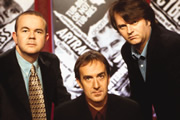
Finally, few would have dreamed that Have I Got News For You on its launch would still be going twenty three years later. None of the regular team were exactly unknown even then - host Angus Deayton had appeared frequently alongside Rowan Atkinson in Alexei Sayle's Stuff, as well as on satellite spoof KYTV, which is discussed later. Stand-up Paul Merton was familiar from Whose Line Is It Anyway?, while "young fogey" Ian Hislop had a high profile as the editor of satirical magazine Private Eye, a position he still holds.
Angus Deayton, of course, sensationally left the programme in 2002 and the series has now had guest hosts for as long as Deayton ever hosted it himself. The topical panel show has notched up more than 400 episodes in total, with Hislop being the only person to have been in every single one.
Other stuff...
It's hard to think of a time when old and new comedy were mixed together so brazenly as in 1990.
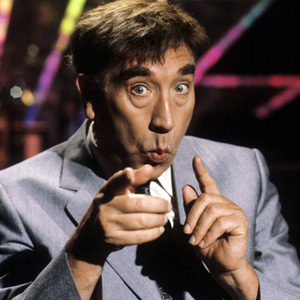
On one hand, traditional comedy still flourished. Comics such as Les Dawson, Les Dennis and Tom O'Connor had retreated into the world of quiz shows, while the more overtly "controversial" ones such as Bernard Manning and Stan Boardman were finding it hard to find a place on telly at all.
But Jim Davidson was still about to land a primetime position as the host of BBC1's snooker-themed comic quiz show Big Break (launched in 1991), and The Benny Hill Show was still around too; although like other series such as Red Dwarf and The New Statesman, it did not actually air in 1990 itself.
Meanwhile, Frankie Howerd was a star once more. Enjoying the final resurgence in his career before his death in 1992, his legendary show Frankie Howerd On Campus, a stand-up performance live in the prestigious Oxford University debating chamber, was broadcast in November 1990.
There were also lots of sitcoms still on: some good, some awful. Although not as successful, retirement home comedy Waiting For God had a similar melancholic tone at times to One Foot In The Grave (actress Janine Duvitski appeared regularly in both). The late Graham Crowden proved excellent as the upbeat Tom while the more pessimistic Diana was well played by Stephanie Cole, an actress in fact only in her late forties at the time.
Other sitcoms of the time - including The Upper Hand (a British version of American Tony Danza vehicle Who's The Boss?), No Job For A Lady (Penelope Keith as a Labour MP) and Bread (hugely popular only a few years before but decidedly stale by 1990) - are best passed over quickly.
It should be mentioned, however, that Only Fools And Horses - passing into permanent Christmas Special status by this point - was the most watched comedy of 1990. Birds Of A Feather, which had launched the year before, also continued to be hugely popular.
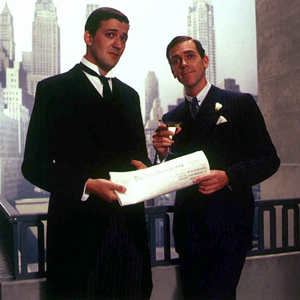
But elsewhere, the young guns of the alternative comedy scene were fast becoming the comedy establishment themselves. Ben Elton was appearing on the Beeb in his own regular series, The Man From Auntie. French & Saunders were not yet appearing in films but were appearing in plenty of parodies, then often based on much older movies (Whatever Happened To Baby Jane?, The Exorcist and Gone With The Wind) than the blockbuster spoofs they later became renowned for. Fry & Laurie too were still together post-Blackadder, producing a third helping of A Bit Of Fry & Laurie while also launching the first four episodes of their acclaimed stint as Jeeves And Wooster.
Aside from playing Mr. Bean, Rowan Atkinson took a lead role in Roald Dahl movie adaptation The Witches, while other comics who had emerged early in the previous decade also attempted to break into film, notably Rik Mayall in Drop Dead Fred and Lenny Henry in True Identity. Both were in fact released the following year and failed at the box office, although Mayall's film did come to develop a cult following. The British film industry continued to languish in the pre-Lottery, post-Thatcher doldrums, Nuns On The Run - starring Eric Idle and Robbie Coltrane - being the only notable British comedy film of 1990. Idle, however, certainly did not live up to his surname, also writing and performing the theme tune to One Foot In The Grave.
Meanwhile, a surprising amount of comedy talent was still emerging. The main Edinburgh Comedy Award went to rising Irish star Sean Hughes, who would crop up in Alan Parker's film The Commitments in 1991. 1990 would also witness the first British Comedy Awards, with winners including Pauline Quirke, Griff Rhys Jones and 1989's A Bit Of A Do, a comedy of manners starring David Jason. Drop The Dead Donkey also fared well as did veteran comics Norman Wisdom, Russ Abbot, Roy Hudd and the then-recently retired comedy legend Ronnie Barker.
Over on Channel 4 the cultish Absolutely - featuring the likes of Jack Docherty, Gordon Kennedy and Morwenna Banks - was bizarre but often amusing. Another ongoing sketch show with plenty of Scottish input was Naked Video, which though never hugely successful itself, spawned two Gregor Fisher spin offs: The Baldy Man and the more enduring Rab C. Nesbitt (Absolutely also had a spin-off, the now largely forgotten Mr. Don And Mr. George, starring Docherty and Moray Hunter). And despite an unlovely name, KYTV transferred Radio Active's Angus Deayton and the late Geoffrey Perkins to the screen alongside Helen Atkinson-Wood for the satellite TV spoof. A steady stream of talent also continued to flow from Channel 4 improvisation show Whose Line Is It Anyway?, notably Paul Merton, Josie Lawrence, Tony Slattery and host Clive Anderson.
The Lady vanishes...
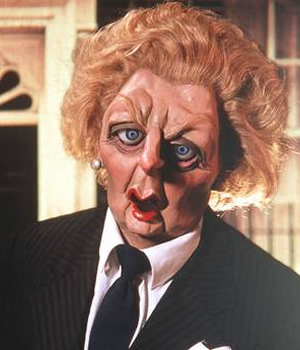
A problem for satirists came with the sudden removal from office of Prime Minister Margaret Thatcher. In theory, the new PM John Major was both easier to draw and, for impressionists like Rory Bremner (who was still on the BBC at this point), to impersonate. But Mrs T had been the life's blood of satire for over a decade, as well as for professional Thatcher impersonators like Faith Brown and Steve Nallon. Her resignation was also awkwardly timed for TV comedy, occurring just after the first series of both Have I Got News For You and Drop The Dead Donkey had finished.
Spitting Image (which, as it turned out, was exactly half way through its twelve year 1984 to 1996 run at this point) initially got round this problem by continuing to feature the fallen leader whenever possible, first as an operator literally controlling the new PM John Major and later as "embarrassing Auntie Margaret" irritating the Cabinet with her unwanted presents and opinions. She later returned to the show again as the Wicked Witch of the South West in a Wizard of Oz parody.
But soon satirists found an identity for John Major. He was either Adrian Mole (as depicted in The Secret Diary of John Major aged 47¾ in Private Eye), or was always wearing his underpants on the outside of his trousers (as portrayed by Steve Bell in the Guardian's If... cartoon). Otherwise, he was either completely grey or perpetually eating peas according to Spitting Image.
Either way, by the end of 1990, the Thatcher comedy era had ended. The 1990s had truly begun...
Help us publish more great content by becoming a BCG Supporter. You'll be backing our mission to champion, celebrate and promote British comedy in all its forms: past, present and future.
We understand times are tough, but if you believe in the power of laughter we'd be honoured to have you join us. Advertising doesn't cover our costs, so every single donation matters and is put to good use. Thank you.
Love comedy? Find out more
